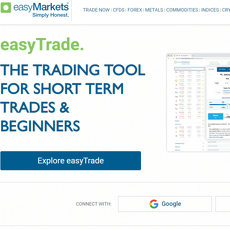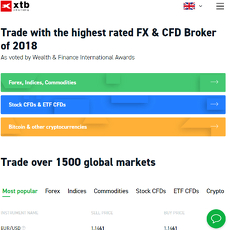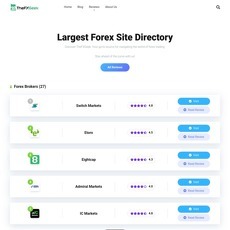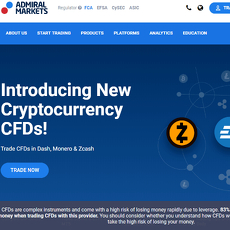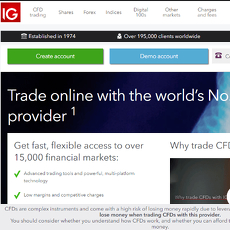UFX.com Review
UFX.com
www.ufx.com
Thinking about Bitcoin CFD Trading on UFX? Here's Why Traders are Hesitant—And How to Overcome It
Have you been eyeing Bitcoin CFD trading on UFX.com but still feeling hesitant to jump in? You’re definitely not alone. You’ve probably heard Bitcoin CFDs can be a great way to trade cryptocurrency without having to own real Bitcoin—but something might be holding you back, right?
That's totally understandable. Trading CFDs, particularly involving cryptocurrency like Bitcoin, can feel confusing, risky, or even scary at first. I get it—I've spoken with countless traders who've expressed same concerns. I constantly review cryptocurrency trading platforms, and I can tell you first-hand that it's common for traders to hesitate before taking those initial steps.
What's Keeping Traders from Trying Bitcoin CFDs at UFX?
The hesitation usually comes down to a few common concerns. Let's take a quick look at what's holding most traders back:
Fear of Risk and Losing Money
This is often the biggest hurdle traders face. After all, we've all heard those stories about significant crypto losses, right? In fact, a 2021 report from the Financial Conduct Authority (FCA) noted that around 76% of CFD traders lose money at some platforms. So, it's no surprise if you're worried about losing your hard-earned funds.
- Bitcoin CFDs do have risk involved, especially if you aren't experienced or prepared.
- Using too much leverage or poorly managing trades can lead to significant losses quickly.
- But remember, risk can be managed effectively—and I'll share some key tips to help reduce this worry in upcoming sections.
Doubts about UFX credibility
Another common hesitation revolves around platform credibility. You might be worried because crypto-related scams have made headlines, and there are always questions floating around: Is UFX legit or just another scammy trading site?
- Many traders question platform reliability, transparent pricing, ease of withdrawing funds, and regulatory oversights.
- You're right to be cautious and careful—I'll closely evaluate UFX’s credibility and legitimacy later, breaking down licenses and user experiences clearly to help you feel more secure.
Not knowing exactly how Bitcoin CFDs work
Not everyone fully understands CFDs—contracts that let you speculate on future Bitcoin price changes without owning the actual cryptocurrency. Confusion about how CFDs operate and what's actually involved in trading them on platforms like UFX stops traders dead in their tracks.
Here's some common confusion:
- "Am I really trading Bitcoin or just a digital agreement?"
- "How does leverage even work?"
- "Can I withdraw profits as real Bitcoin?"
If you're feeling uncertain about exactly how Bitcoin CFDs function, that's absolutely normal! Believe me—you're not alone.
Don’t Worry! Here's the Real Solution:
By addressing these concerns head-on, I'm here to guide you step by step. My thorough breakdown will help clear your doubts about UFX's legitimacy and simplify exactly what Bitcoin CFDs are. I'll also explain clearly and simply how you can minimize risk and trade more confidently.
Are Bitcoin CFDs at UFX genuinely profitable and worth your precious time and money? Let's find out clearly in the next section. I'll take you through exactly what Bitcoin CFD trading is all about—step by step—showing how it actually works on UFX. Keep reading! You may find the answers surprising…
What exactly is Bitcoin CFD trading, and how does it work on UFX?
Before you even think about putting money into Bitcoin CFDs, you absolutely need to know what you're dealing with. Let me break this down clearly and simply, just like chatting with a friend over coffee.
What is a Bitcoin CFD, Anyway?
CFD stands for "Contract for Difference". Basically, it's an agreement between you and the trading platform—in this case, UFX—to profit from changes in Bitcoin's price without actually having to own any Bitcoin. Sounds intriguing, right?
Let me give you an easy example:
- Suppose Bitcoin is trading at $30,000. You think the price will go up, so you open a CFD position predicting a rise.
- If the price climbs to $31,000, you earn a profit based on how big your trade was, minus any applicable fees.
- If the price drops instead, you'd lose money based on the size of the price drop.
The beauty of CFDs is that you can profit both when Bitcoin prices rise or fall by choosing the right position. But keep in mind, the losses can also add up if the market moves against you—so caution is key!
"The stock market is filled with individuals who know the price of everything, but the value of nothing." — Philip Fisher
This quote reminds me of CFD traders. Everyone knows Bitcoin's current price, but the real trick is understanding how to leverage that number to your advantage without actually owning the underlying asset.
How Bitcoin CFD Trading Works on UFX.com
Alright, now let’s see exactly what happens when you decide to trade Bitcoin CFDs with UFX. I've personally looked into their platform; here’s the step-by-step:
- Register & Deposit: First, you open an account and deposit your desired trading amount.
- Select CFD for Bitcoin: Go to the trading dashboard and find "Bitcoin CFD" from their asset list.
- Choose Position: Select whether you want to go "long" (predicting Bitcoin's price to rise) or "short" (predicting it to fall).
- Apply Leverage: You can choose leverage, meaning you trade with larger positions using only part of your original capital. For example, if you use 1:10 leverage with $1,000 deposited, you're essentially trading with $10,000. Higher stakes, higher rewards—but also higher risks!
- Place Trade: After choosing your trade size and leverage level, you click the trade button—and bam, you've got your first Bitcoin CFD trade running.
- Monitor and Manage: You can keep track live as prices move, profits and losses fluctuate. UFX has real-time price charts and position management tools, letting you exit or adjust your trade as the market shifts.
In my research into UFX, I noticed their trading spreads (the difference between buying and selling prices) and fees were clearly shown upfront—no funny business. Still, you should always check these carefully at the time you enter your trade. Hidden fees or unexpected costs are your enemies!
To offer a straightforward example with numbers:
- Let’s say you open a Bitcoin CFD for a trade size of 0.1 Bitcoin (BTC) at $30,000.
- Bitcoin’s price then rises to $31,000 a few hours later.
- Your profit would be: (31,000 - 30,000) x 0.1 BTC = $100 in profit, minus applicable fees.
Conversely, if Bitcoin fell to $29,000, your calculation would show a loss of $100.
Now that you've got a strong grip on how Bitcoin CFD trading on UFX works, you might be asking yourself: is trading CFDs on UFX really as good as it sounds? What are the biggest advantages—and more importantly, what are the pitfalls you need to avoid?
Stick with me, we've just scratched the surface. If you're curious to find out whether you're making a clever move or stepping into a trap, the next chapter covers exactly the pros and cons you urgently need to know.
Pros and Cons of Trading Bitcoin CFDs on UFX
If you're thinking of jumping into Bitcoin CFD trading on UFX, you're probably wondering what's actually good about it— and what might make you cautious. Let me share a straight-up, honest review of both sides, backed by real traders' experiences and industry insights to give you the clearest picture possible.
Advantages of Bitcoin CFD Trading on UFX
- Easy-to-use Platform: Even if you're not tech-savvy, UFX's platform is designed with the beginner trader in mind. Everything's intuitive, easy to find, and simple to manage, saving you the stress of complicated trading screens.
- Flexible Leverage: UFX allows you to adjust leverage based on your risk tolerance and strategy. This flexibility means that you can amplify your potential gains—but be cautious, as leverage can magnify losses too.
- Reliable Order Execution: Traders often cite UFX's dependable and responsive order system. When markets move fast, every second counts, and reliable execution could make the difference between profit and loss.
- Solid Customer Support: Technical glitches or concerns? UFX offers responsive support available 24/5, assisting promptly via live chat, phone, or email—something many traders genuinely appreciate.
- Automation & Advanced Features: The availability of advanced features and automation makes trading smoother and less time-consuming. Whether you prefer hands-on trading or automation, UFX has the features to accommodate your style.
"The essence of strategy is choosing what not to do." – Michael Porter
Drawbacks of Bitcoin CFD Trading on UFX
- High Risk with Leverage: While leverage can significantly boost profits, it also substantially increases your potential losses. Studies suggest that around 80% of CFD traders lose money when leveraging aggressively. Be mindful and start small until you're comfortable.
- Complex Fee Structure: Understanding all the potential fees on UFX can require a little digging. Traders complain occasionally about unexpected fees for inactivity, holding your positions overnight (swap rates), or withdrawal conditions. Always double-check these details ahead of time.
- You Don't Actually Own Bitcoin: Remember, with Bitcoin CFDs, you're only trading contracts. You're speculating on Bitcoin’s price movements—up or down—but you never hold or own actual Bitcoins. If ownership is important to your investment approach, you might feel limited here.
So far, you've seen the good, the bad, and the in-between. But a lingering question might be nagging you: "Yeah, sure, but is UFX trustworthy? How can I really know my money is safe here?" Well, stick with me—I'm about to share exactly what I found out in my next section: "Is UFX.com Safe and Legit for Bitcoin CFD Trading?" Let's check that out now!
Is UFX.com Safe and Legit for Bitcoin CFD Trading?
You've probably heard plenty of horror stories, right? Traders signing up to random platforms and losing all their earnings overnight. That's exactly why understanding the safety and legitimacy of UFX.com for Bitcoin CFD trading is essential. Let's cut through the noise and see what's really going on here.
Licenses and Regulations: Is UFX.com Legit?
Let's face facts: the online trading world attracts scammers. Every legit broker needs valid licenses and regulation. So, does UFX.com make the cut?
I did my homework, and here's what I found:
- UFX.com is operated by Reliantco Investments Ltd, authorized and regulated by the Cyprus Securities and Exchange Commission (CySEC) under license no. 127/10.
- CySEC regulation is no joke—it's a rigorous authority following strict EU financial regulations, which is a good sign of trustworthiness.
- They're also MiFID compliant, allowing them to operate smoothly throughout Europe, ensuring extra layers of protection for European traders.
"Trust takes years to build, seconds to break, and forever to repair." — Anonymous Investor
Bottom line? UFX.com has solid regulatory credentials, definitely bringing the safety factor up a notch.
Checking User Reviews and Experiences
Regulators are just one side of the equation, though. What about real traders—people like you and me? Is there chatter about slow withdrawals, technical glitches, or shady practices?
I went deep into user forums, social platforms, community sites, and trading reviews to gauge trader sentiment on UFX.com. A quick breakdown:
- Positive Experiences: Users often highlight responsive customer support, good trading execution speed, and fairly fast withdrawals—a pleasant surprise in a world notorious for snail-paced payouts. A good number praised their user-friendly interface too.
- Negative Feedback: Some traders noted pushy account managers trying to upsell features, occasional platform lag during volatile market moments, or complex fees structures that left beginners somewhat confused.
Overall, the sentiment is more positive than negative, but it's wise to always pay attention to recurring red flags from users and evaluate how they affect your trading style personally.
Security Measures at UFX: Is Your Money Safe Here?
Another major point traders worry about is security—rightly so. After all, security breaches have become way too frequent in the crypto world. So how does UFX stack up?
- Funds Segregation: UFX keeps traders' money separate from company capital—this ensures your investment isn't wiped out if the broker faces financial trouble.
- Strong Encryption: The platform utilizes industry-leading SSL encryption technology to protect user data, financial transactions, and communications.
- Account Verification and Anti-Money Laundering (AML): UFX adheres to strict KYC and AML protocols, reducing fraud and suspicious activity considerably.
Sounds convincing, right? Indeed, UFX seems to take the confidentiality and integrity of funds seriously, aligning closely with best practices.
But what about hidden fees or secret charges that could eat into your profits? Is your wallet safe from unexpected surprises while trading Bitcoin CFDs on UFX?
Keep reading, because that's exactly what we're about to shine a bright spotlight on next...
Costs, Fees, and Pricing on UFX.com Bitcoin CFD Trading
Let's get real for a moment—one of the biggest worries biting at every trader's wallet before opting into Bitcoin CFD trading on any platform is the expense. Fees, spreads, hidden charges—they can all quietly chip away at your profits if you're unaware. So let’s take a crystal-clear look at how much it could actually cost you on UFX.com.
Trading fees and Spreads at UFX
First things first, trading fees are what you pay every time you open (or close) a CFD trade. Rather than fixed commissions, UFX typically charges through spreads, which is simply the difference between the buying ("ask") price and the selling ("bid") price at any moment. For Bitcoin CFDs, spreads on platforms like UFX tend to widen and narrow depending on market volatility.
"Low spreads can drastically impact your overall trading success, especially if you open multiple positions each day." – Renowned Cryptocurrency Analyst, William Epic.
On UFX, typical Bitcoin CFD spreads fluctuate around 100 to 150 USD per Bitcoin, which means if you're entering a position of one Bitcoin CFD (BTC/USD), you're already down by that amount at the trade entry. That might not seem massive at first glance, but when trading regularly, these little margins add up.
- Example:Suppose the market bid price of Bitcoin is $30,000, the spread of $120 means your trade starts at $30,120 as your entry price. To be profitable, the price must increase above this figure.
Hidden Costs and Additional Charges
Nobody enjoys surprising charges popping out of nowhere. So, does UFX quietly hit you with hidden fees? Well, while there aren't any super-secret charges with sneaky fine print at UFX, there are two costs that might catch you off guard if you're not careful:
- Withdrawal Fees: UFX reportedly can sometimes charge small withdrawal fees depending on your payment method—usually around $25 per withdrawal. While this isn't huge, frequent withdrawals could quickly add up.
- Inactivity Fees: If you haven't made any trades within 3 months, an inactivity fee kicks in at UFX, typically $50. To avoid these fees, staying active or at least logging into your account regularly can help.
Are UFX Fees Reasonable Compared to other Platforms?
Now, the real question is—do these fees and spreads at UFX truly stack up against other visible options out there? Let's quickly compare:
- UFX vs eToro:eToro generally offers comparable spreads around the 0.75% mark, roughly similar to UFX. However, eToro doesn't charge withdrawal fees once you acquire diamond membership status—an attractive incentive for frequent traders.
- UFX vs Plus500: Plus500 typically has narrower spreads on Bitcoin CFDs, on average around $80 per BTC/USD trade. At first glance, traders looking for tighter spreads may lean towards Plus500 for frequent trading.
When comparing, the fees at UFX seem fairly competitive, but they aren't necessarily groundbreaking or the lowest market option. It's essential to measure these against your style of trading—whether you're aggressive, frequently in and out of positions, or taking a longer-term approach.
So, you probably now understand clearly how the fees could shape your trading journey—but do you know how to effectively shield yourself from costly mistakes and increase your trading success? What if there were strategic tips to save big on trading costs and keep your wallet happy, ensuring you hold onto more of your profits?
Stay tuned, because in the next section, I'll share some powerful tips and strategies that highly successful traders use to manage risks, avoid expensive slip-ups, and boost their trading gains effectively over time!
Best Practices: Tips to Safely Trade Bitcoin CFDs on UFX
Nobody likes to lose money, especially when trading Bitcoin CFDs. Believe me, I've seen even talented traders crash and burn simply because they overlooked the basics of safe trading practices. Let's cut straight to the chase—I'll share proven tips you need right now to minimize your risk and boost your chance of success on UFX.com.
Managing Your Risk Effectively
"Risk comes from not knowing what you're doing." — Warren Buffett
Let's be honest—CFD trading with Bitcoin can feel like gambling if you're not careful. But the good news? Effective risk management turns guesswork into strategic action. Here are my tested recommendations:
- Use Leverage Wisely: Leveraged CFD trading magnifies wins—and sadly, losses too. So, the magic here is moderation. Instead of jumping all-in at 1:400 leverage, start smaller at 1:10 or even less. A 2019 SSRN study found lower leverage significantly improved traders' survival rates.
- Always Set Stop-Losses: You might be tempted to "ride out" losses, but the best traders know when to cut their losses quickly. Learn to set strategic stop-losses based on realistic numbers—not wishful thinking.
- Be Realistic With Your Goals: Bitcoin CFDs won't make you a millionaire overnight—usually. Aim small, consistent gains rather than huge one-off jackpots—the tortoise wins this trading race, trust me.
Learning from Other Traders' Mistakes
It's smart to learn from other people's blunders, rather than test the waters yourself. Some of the most common mistakes I've noticed (and helped others avoid):
- Overtrading: Not every day needs active trades. Be selective—avoid FOMO (fear of missing out)—it has wiped out more trading accounts than I can count.
- Ignoring Market News: Bitcoin is highly news-sensitive. Subscribe to reliable sources, keep your ear to the ground, and avoid getting blindsided by sudden moves on the charts.
- Failing To Record Trades: How do you improve if you never track your performance? Log your trades, analyze wins and losses, and see patterns clearly. Trading blind guarantees repeated mistakes.
Having a Solid Trading Plan
Your emotions are your biggest enemy in trading, I promise you. Even the calmest trader becomes irrational when Bitcoin volatility kicks. What's your antidote? A concrete trading plan.
- Define exactly what your entry and exit points will be, based on concrete analysis—not gut intuition.
- Stick strictly to your set risk tolerance, trade size, and how much you're prepared to lose daily or weekly.
- Keep refining your strategy. Metrics matter—consistency matters even more.
Trust me, with these tactics, you're miles ahead of the average trader. But wait—you might be wondering: even with perfect preparation, is UFX.com truly the platform you can trust to execute all these great strategies?
Great question. Let me show you my own personal experience with UFX Bitcoin CFDs next, the good, the bad, and the truth you deserve to know. Ready to find out?
My Personal Verdict: Should You Trade Bitcoin CFDs on UFX.com?
Now that we've walked through every nook and cranny of Bitcoin CFD trading on UFX, it's time I give you my honest evaluation of whether UFX is really worth your time and effort. Remember, it's crucial to match your trading style, experience, and financial goals with the right platform. Let's figure out if UFX fits the bill.
Evaluating the Overall Trading Experience on UFX
When it comes to trading experience, the first thing that matters for me—just like you—is usability. And I must say, the clean layout and simple navigation of UFX instantly earned a thumbs up from me. I didn't have to scratch my head trying to figure out how things work, and trading felt pleasantly intuitive.
Order execution on UFX felt speedy and reliable on most occasions. Market orders, in my experience, happened nearly instantaneously and matched the displayed prices closely—something essential when trading volatile assets like Bitcoin CFDs.
One minor hiccup I did note during my testing, though, was occasional widening of spreads during major market swings—something fairly common in CFD providers. It didn't happen often enough to discourage me, but if you're very picky about tight spreads in extremely volatile conditions, keep this in mind.
"Trading is not about being right every time; it's about learning to stay profitable even when you're wrong." — Unknown
I love this quote, and it applies well to my thoughts on UFX: It's not about trying to find a perfect platform, but instead choosing one that complements your trading style and manages your risk effectively.
Who Should and Shouldn't Be Trading on UFX?
Here's the deal: From all my research, trading experience, and reviewing countless crypto platforms, here's who I think could make the most and the least out of Bitcoin CFDs trading on UFX:
- You should trade Bitcoin CFDs with UFX if….
- You're an intermediate to experienced trader who values user-friendly interfaces, reliable order execution, and responsive customer support.
- You enjoy flexible leverage options, yet understand the inherent risks and manage your trading responsibly.
- You're comfortable with trading contract derivatives rather than worrying about crypto wallets or actual ownership of Bitcoin.
- You probably shouldn't trade Bitcoin CFDs with UFX if…
- You're completely new to trading or crypto investing and don't yet fully grasp CFDs and leveraged trading risk.
- Your intention is long-term asset holding and actually owning Bitcoin—more suited for platforms dedicated to buying real cryptocurrencies.
- You seek ultra-low spreads at all times and may be disturbed by fluctuating spreads on highly volatile market movements.
Think about which group best describes you. Choosing the platform that aligns best with your needs and experience level is the single most critical factor that determines your success and enjoyment of trading Bitcoin CFDs.
But wait! Maybe you're thinking right now: "What if UFX isn't the perfect fit for me? Are there alternatives?" Great question! Keep reading because up next, I'm going to check some fantastic resources and trusted alternatives you should definitely consider before finalizing your choice. After all, nothing beats being fully prepared, right?
Resources & Alternatives for Bitcoin CFD Trading You May Find Useful
Before you fully commit to trading Bitcoin CFDs on UFX.com or any other platform, it's smart to look around, do some research, and see what's out there. Luckily, I've done exactly that many times, and I'd love to share some great resources and platforms you may find extremely helpful.
Recommended Resources for Bitcoin and Crypto Trading
No matter how experienced you are, the cryptocurrency world is constantly evolving. That's why keeping your knowledge up to date using reliable resources is crucial for successful trading. I always suggest finding trustworthy educational sites and platforms focused specifically on crypto and CFDs — rather than relying solely on forums or random YouTube videos.
Here are some highly reputable sources that I personally recommend to learn more about Bitcoin CFDs and cryptocurrency trading:
- Investopedia: They offer excellent guides on CFD trading basics and understanding Bitcoin derivatives clearly and simply.
- BabyPips School: Perfect for beginners, BabyPips gives structured and easy-to-follow tutorials about risk management, market psychology, CFDs, and crypto trading basics.
- CoinDesk: Stay updated about recent news and events shaping the crypto market every day, which can significantly affect your trading outcomes.
Comparing UFX with Alternative CFD Trading Platforms
As part of responsible trading, you may also want to consider your alternatives and compare various platforms. Each one has its unique strength or disadvantages depending on your trading style and preferences.
Let me quickly share some other platforms worth checking:
- eToro: Famous for its social trading feature and ease of use, eToro lets you interactively follow successful traders. It offers clear fee structures and is great if you're just starting out.
- Plus500: Known for competitive spreads and robust platform stability, Plus500 appeals massively to traders looking for low fees and powerful technical tools.
- AvaTrade: With outstanding educational resources and dependable customer support, AvaTrade caters specifically to traders who prefer solid education and assistance along the way.
As I've learned time and again from helping many traders, there's never a "one-size-fits-all" solution. Having a couple of alternatives in mind helps you make better trading decisions, saves you money, and increases your confidence.
Now that you've seen resources I trust and alternative platforms I recommend... Do you still have questions or unresolved doubts about Bitcoin CFDs and UFX.com? Stick around — because the next part answers the most pressing questions traders constantly ask me about Bitcoin CFD trading. Are you ready for answers you've been looking for? Let's find out!
Frequently Asked Questions: Your Common Bitcoin CFD-UFX Doubts Clarified
If you're still confused or unsure about Bitcoin CFD trading on UFX.com, I totally get it—you're not alone. I've heard many traders ask the same questions. Here, I'll clearly answer some of the most common concerns traders have expressed about Bitcoin CFDs on UFX.
"Is CFD trading on Bitcoin profitable?"
Here's the simple truth: Bitcoin CFDs absolutely can be profitable—if you approach them smartly. Some traders have achieved solid gains because CFDs let you profit from market swings, upward and downward. On the other hand, trading with leverage amplifies both profits and losses, so just blindly jumping into a trade is always risky.
Pro tip: The key to successful CFD trading is solid risk management and proper education—with stable strategies and clear trading rules, your profitability chances massively improve. One study by FCA showed around 30%-40% of CFD traders made money consistently—but they all had clear strategies in place.
"Can I lose more money than I deposit on UFX Bitcoin CFDs?"
Thankfully, at UFX (and most regulated CFD platforms), you typically can't lose more than you've deposited. UFX offers automatic negative balance protection, meaning if a market movement goes against you so sharply that your position wipes out your account balance, it won't dip below zero or put you in debt to the platform.
But it's important you fully understand leverage and margin calls. A margin call happens when your account drops below the amount required to maintain your positions—UFX may then automatically close positions to limit further losses. Be prepared, using stop-loss orders and careful leverage choices to keep your risk manageable.
"Do I own actual Bitcoin when trading CFDs on UFX?"
Nope, and that's something everyone needs to be crystal clear about. When trading Bitcoin CFDs, you aren't actually holding any Bitcoin. You're simply betting on price movements via a contract with UFX. That means you don't need a wallet, you won't receive real coins, and you can't move BTC off the platform. Keep that in mind: CFDs are purely speculative tools for short-term gains, not a way to accumulate actual Bitcoin holdings.
"How do taxes work for Bitcoin CFD profits?"
The tax implications of Bitcoin CFD trading can vary significantly from jurisdiction to jurisdiction. Usually, profits made from CFD trading could count as capital gains or trading income—depending on your country's specific tax laws. My best advice? Don't guess, speak with a tax advisor or accountant in your country. It's always worth a quick chat to keep yourself stress-free when tax season rolls around.
"Is UFX a scam or a legitimate trading platform?"
After thoroughly researching, I can confidently say UFX.com is a fully regulated and legitimate trading platform—not a scam. UFX is regulated and monitored by internationally respected authorities like CySEC and complies with strict regulatory guidelines.
However, I have seen some user complaints about withdrawal wait times or customer service responsiveness, but nothing serious regarding serious legal issues or fraud. With reasonable expectations, responsible risk management, and an understanding of CFD specifics, UFX is safe to use.
Final Thoughts for Safe Bitcoin CFD Trading (Conclusion)
As someone who's extensively reviewed dozens of cryptocurrency platforms, here's my heartfelt advice: Bitcoin CFDs on UFX can offer genuine opportunities for traders who know exactly what they're getting into and take proper precautions. They're ideal if you're short-term oriented, confident managing risks, and clear on how CFDs function.
If I had to leave you with a final tip I learned the hard way from reviewing dozens of platforms, it's this: always start small, always manage your risk wisely, and NEVER trade your emotions. Trading successfully isn't about fast money—it's about smart, responsible moves that steadily build your experience. My hope is that our conversation here has cleared your doubts, built your confidence, and helps guide you safely into a rewarding Bitcoin CFD trading journey.




